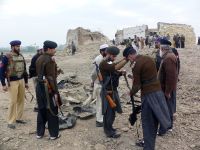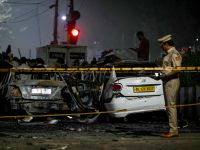Just hours ahead of a truce deadline, Israel eased the pressure Friday by saying the timing of the ceasefire was flexible following the latest deaths in three weeks of clashes with the Palestinians.
US President Bill Clinton called Israeli Prime Minister Ehud Barak and Palestinian leader Yasser Arafat for 20 minutes each late Thursday to attempt to cool the tension jeopardizing the fragile Sharm el-Sheikh truce.
While there was no written agreement at the Sharm el-Sheikh emergency summit in Egypt brokered by Clinton, a 48-hour end of hostilities was announced. This was later extended to Friday afternoon.
However, an Israeli government spokesman Friday called the deadline "flexible."
"We started to count from the meeting between security people from both sides (on Wednesday), so it's supposed to be late afternoon or evening. But we are flexible on this," foreign ministry spokesman Noam Katz told AFP.
But the remaining hours before the deadline would be a crucial test of the truce, UN Secretary General Kofi Annan said Thursday.
"Between now and tomorrow evening will be a crucial period," he told reporters as he returned to UN headquarters after 11 days in the Middle East during which he attended the Sharm el-Sheikh summit.
Violence continued on the eve of the deadline.
A Jewish settler and a Palestinian were killed during hours of fierce gun fighting on a hilltop in the northern West Bank, and Israeli authorities were bracing for possible clashes amid preparations for their funerals.
Like every Friday since the September 28 start of the Palestinian uprising, Israeli police are tightening security in sensitive areas, including the Old City of Jerusalem where Muslims made their way to weekly prayers.
The latest deaths occurred when a Palestinian was shot dead and 14 others wounded by a group of Jewish settlers hiking in the village of Askar near the West Bank town of Nablus, which has been a flashpoint during the violence.
One Israeli was killed when the group of about 30 people, including women and children, came under a barrage of fire from Askar, the army said.
Israeli helicopter gunships fired on the area as they tried to evacuate the settlers, who said they were forced to take cover on the rocky outcrop.
Another five settlers were injured before the army said it succeeded in evacuating all of those trapped on the hill.
The deaths brought to 114 the number of people killed in the three weeks of bloody clashes between Israel and the Palestinians.
Israel eased some of its blockade of the Palestinian territories Thursday, allowing flights to resume from the international airport in the Gaza Strip and opening a crossing point for freight from the West Bank.
Meanwhile, Israel said it would refuse to cooperate with a "hostile" UN human rights inquiry into alleged Israeli abuses against Palestinians, set up by a UN meeting in Geneva.
"Israel rejects this hostile, inequitable and useless resolution voted by a small majority of Arab countries and their supporters," its foreign ministry said in a statement.
Nineteen of the commission's 53 members supported the proposal, presented by Arab and Muslim states, after three days of discussions at a rare special session.
Western countries, notably those in the European Union, United States and Canada, made up the 16 members, which voted against the resolution. Another 17 members abstained and one member was absent.
The UN forum's members also agreed to ask UN High Commissioner for Human Rights Mary Robinson to urgently visit the Palestinian territories to "take stock" of the human rights violations of Palestinians – JERUSALEM (AFP)
© 2000 Al Bawaba (www.albawaba.com)







